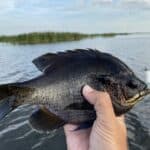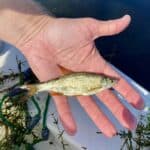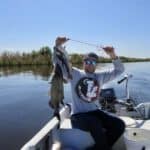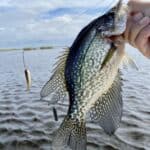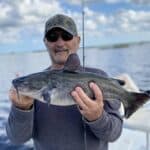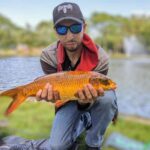Many anglers have heard that fishing after rain can lead to more success- but is that really the case? And if so, why?
I personally LOVE to go fishing after the rain. In my experience, the quick changes in weather spike activity in the entire food chain of a lake or pond.
This page contains affiliate links. As an Amazon Associate, I earn from qualifying purchases.
Table of Contents
Is It Good To Fish After It Rains?
Fishing after it rains can be a very good time go to fishing. Rainfall can lower barometric pressure and increase water current and sediment runoff, which means more microorganisms and insects in the water column for fish to feed on and increases overall activity.
Rainfall can really stir things up in a lake, pond or river and any changes like that can mean an opportunity to find hungry fish. Try looking at areas where there is a lot of run off, or near the mouths of creeks, inlets, and even dams.
More Rain = Water flow = Forage Base Adjustment (think of all the Zooplankton, fish eggs, insect larvae, and bottom sediment that is stirred up).
Fishing pressure is always very little directly after it rains because not many people fish during a bad rainstorm. I love getting onto the lake just after it rained, I usually have the place to myself!
However- too much rain can also hurt your chances of success. Flooding conditions can be dangerous, and lead to silty dirty water or change the pH levels of lakes.
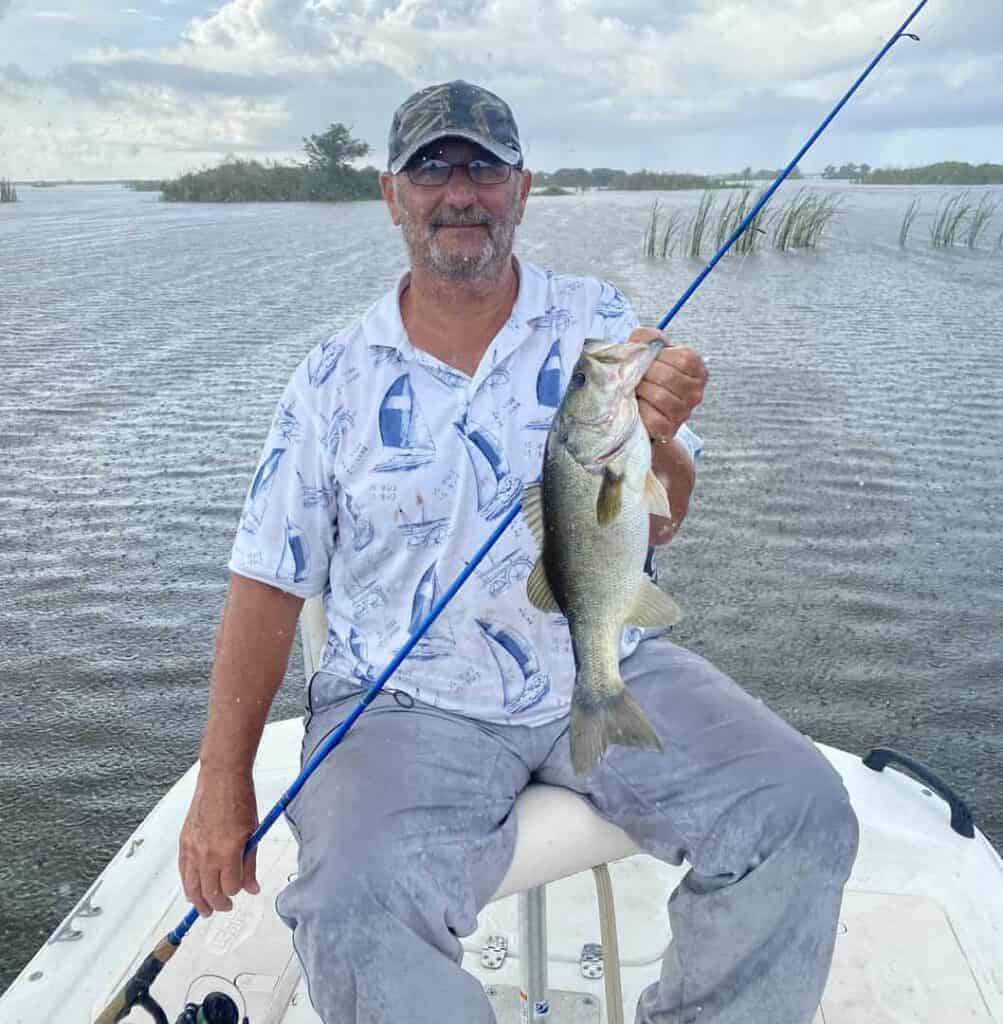
Do Fish Bite More After It Rains?
Yes, in many cases, you will get more bites after it rains. As the barometric pressure stabilizes after rain, fish will return to normal feeding patterns.
Take advantage of this window and fish areas with high water flow!
How Do You Catch Fish After Heavy Rain?
The first thing to look for after a period of heavy rain is concentrated areas of water movement. This would be areas such as creek mouths, waterfalls, and even concrete dams and water structure.
The reason for this is because fish will stage up in these areas waiting to ambush food as it’s pushed by. The heavy rainfall increases the water current and can actually create a fishing frenzy!
Use large, aggressive baits after heavy rain. Topwater baits such as poppers and buzz baits can work very well when targeting bass. Swimbaits work well for nearly all species, especially if you let the current naturally drift your bait.
If you are fishing an area without any current, keep an eye out for surface activity. Some species of fish may rise or fall within the water column as their swim bladders adjust to rising water levels.
It’s not uncommon to spot smallmouth bass, largemouth bass, northern pike, or muskie swimming just beneath the surface in shallow water after heavy rain.
How Weather Impacts Fishing
Bad weather is inevitable if you spend any significant time on the water or in the outdoors. It’s bound to happen, so it’s very important to understand how weather like rain, cold fronts, and storms can influence your fishing success.
Here is a list of different weather types of bad weather conditions your likely to encounter when fishing and what to do:
| Bad Weather Pattern | How to Fish |
|---|---|
| Storm front or bad weather is approaching | Get out and fish! Pre-front is one of the best times for fish feeding activity. |
| Light rain, cloudy conditions | Try using topwater or other loud/noisy baits. Can be very good! |
| Heavy rain and wind | Fish areas where baitfish will be pushed from the wind; points, cuts, channels, embankments. |
| The storm has passed, but VERY windy conditions | The bite may be slow, fish small finesse style baits; try deep and protected areas. |
| Cold weather or a sudden drop in temperature | Very difficult conditions- slow down your presentation, try live bait and use electronics to find fish on thermoclines. |
Barometric Pressure
Atmospheric pressure, or sometimes called Barometric pressure is the most important weather-related factor for fishing and anglers.
Barometric pressure is the measurement of air pressure in our atmosphere. It fluctuates with different weather patterns every day, and these changes cause fish to behave differently.
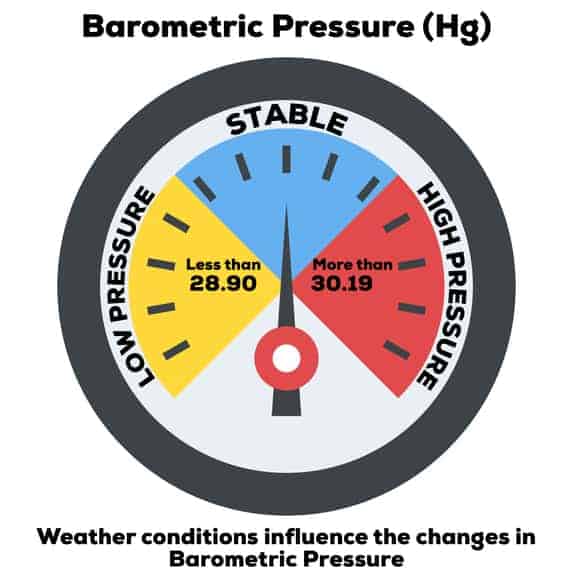
For example, before it rains, cooler temperatures cause the barometric pressure to lower. When it gets warmer, the pressure rises. When weather patterns remain clear and calm, this is considered stable.
The fish tend to move more when the pressure is changing. Generally speaking, they seek out cover in lower pressures but will actively search for food when the pressure rises. They may also move into shallower water when the pressure is dropping.
Dropping barometric pressures cause fish to become more active- which is a great time to fish.
Anything below 29.80 inHg is considered low pressure and likely means foul weather is on the way!
Use a fishing barometer to quickly and easily track the barometric pressure in your area. It’s one of the most efficient tools an angler can use to predict fish patterns.

Is Fishing Good Before a Storm?
Yes! My absolute favorite time to fish is ‘pre-front’ or before an approaching storm. This is usually best ~12 hours or so before the storm front hits.
This drop in pressure can cause fish to really feed actively and aggressively. My theory is that they know when bad weather is approaching so they feed up in case they can’t during a period of bad weather.
Many anglers will agree that fishing before a storm can be excellent. Always watch the weather and be safe!
Do Fish Know When a Storm Is Coming?
All species of fish are masters of their environment, and can usually sense even the smallest changes in weather. This may include temperature, rain, and even wind.
If you’ve ever been fishing and noticed the ‘bite’ suddenly turn on/off, it may have been related to the fish reacting to a change in weather.
Most fish are equipped with a swim bladder, which assists with buoyancy and respiratory functions. But it may also help fish ‘sense’ changes in pressure; or in other words, tell them when a storm is coming.
Not a lot of studies have been conducted to prove this one way or another, but there is no doubt that fish react to storms, and other changes in weather.
Monitor Rain Storms To Plan Your Trip
If I have a day of fishing planned, and the forecast is calling for rainstorms I simply adjust my plan of attack.
By closely monitoring radar, wind direction, and weather patterns I can usually find a portion of the lake that won’t get rain, or provide some shelter from the weather.
And if the rain is inevitable, no big deal. I’ve spent plenty of morning in the truck waiting for the rain to pass, before launching the boat.
Throw on a quality rain jacket, and get to fishing. Some of my best fishing stories happened during, or just after the rain.
A light drizzle after a passing rainstorm is the perfect time to get on the water, and as I mentioned before, the first thing I’m looking for is running water…predator fish like bass will be nearby.
Do Fish Bite When It’s Windy (After The Rain)?
Yes, fish will bite when it’s windy outside. The wind can stir up food such as zooplankton and insects, and funnel baitfish against banks or into channels.
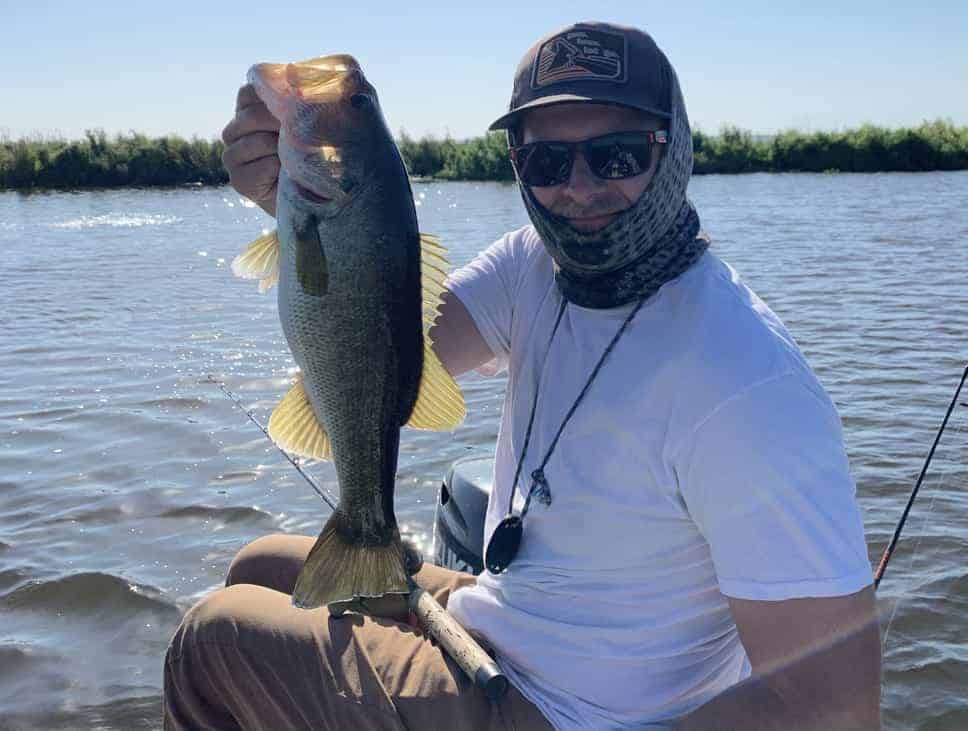
I used to get very frustrated when trying to fish in the wind, it can make casting more difficult. However, I now realize that windy conditions can really stimulate feeding activity. When it’s windy, fish in the wind! Do not try and hide from it!
Fishing in the wind Tips:
- Use a heavier weight or heavier lures, it will make casting easier.
- If you’re fishing from a boat, use the anchor or set up a drift with the wind along a bank or edge.
- Keep an eye out for diving birds, they will find the places baitfish are concentrated from windy conditions.
- Wear a UV-rated fishing buff, this will prevent windburn and keep your skin protected.
- Always approach your fishing spot from downwind, it’s easier to control the boat and be stealthy.
What Weather Is the Best for Fishing?
A fall in barometric pressure before a storm is often considered the best time to go fishing. Other factors such as wind speed, water temperature, and time of year play a large role in fishing success.
Fish are cold-blooded creatures, which means they need to seek ways to warm and cool their bodies. They will move to cooler water when they are hot and do the opposite when they feel too cold.
Consider the time of year you are fishing. For example, during the summer an approaching storm may cool things off and stimulate feeding. In the winter, unusually warm weather may turn the bite on.
Each lake, pond, river or water system is different. But as the old saying goes, a ‘good day on the lake is better than a bad day in the office!’
Final Thoughts
If you fish often enough, you are going to encounter bad weather such as rain and wind. Don’t let this keep you from enjoying a nice day on the water.
Instead, check the weather and study the conditions. Pay attention to the insects, baitfish, birds, and predatory fish around you. Track your progress and failures and you will begin to find patterns.
As I mentioned, fishing just before or just after it rains is one of my favorite times to go. So dress appropriately, prepare and get outside and go fishing!
You May Also Like: Do Catfish Bite in Cold Weather? (And How To Find Them!)
If you haven’t guessed yet, I love fishing and everything about it!
To learn more about why I started Panfish Nation, visit the About page and follow along on Social Media:
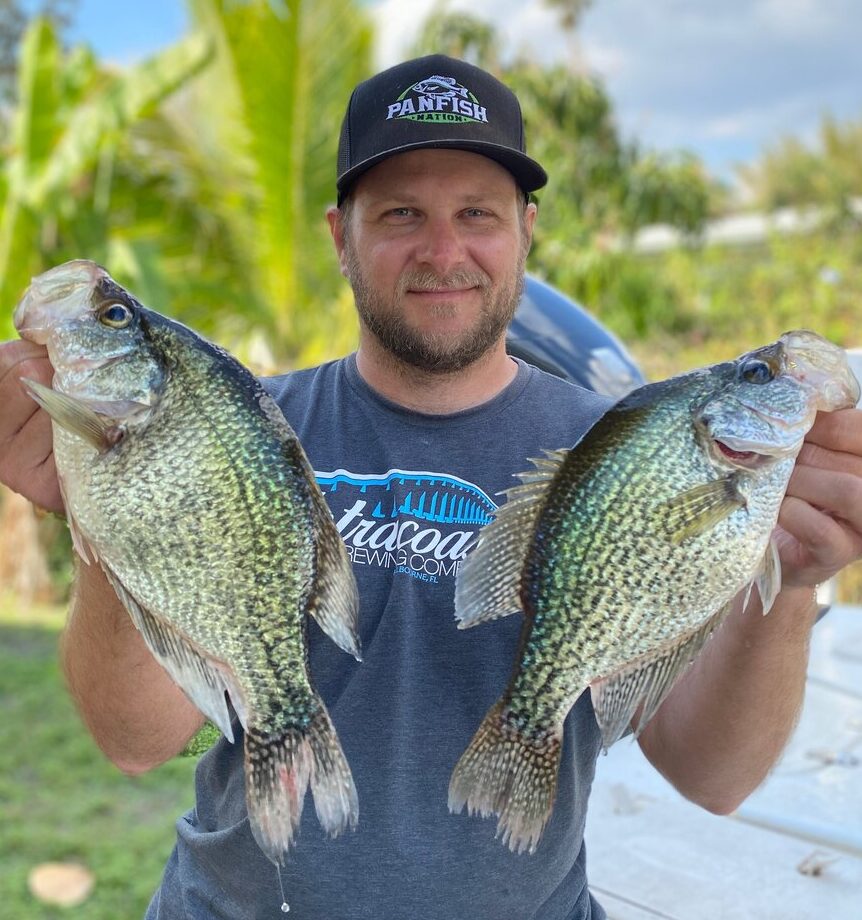
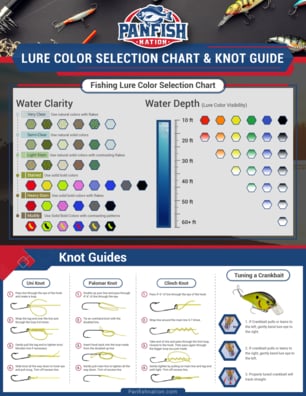
Download a copy of my FREE Lure Color Selection Chart & Knot Guide!
Stay up to date with fishing reports, tackle reviews, industry news, and much more! We respect your privacy, unsubscribe at any time.
Related Posts
- How To Hold A Bluegill: Tips and Best Practices
- How To Catch Wild Shiners For Bait (Step By Step W/Pics)
- How To Use A Fish Stringer (Easy Explanation W/Tips)
- How To Keep Minnows Alive Without an Aerator (7 Tips)
- Why You Should Be Using Kool-Aid As Catfish Bait!
- How to Catch Koi Fish (And Are They Edible?)

